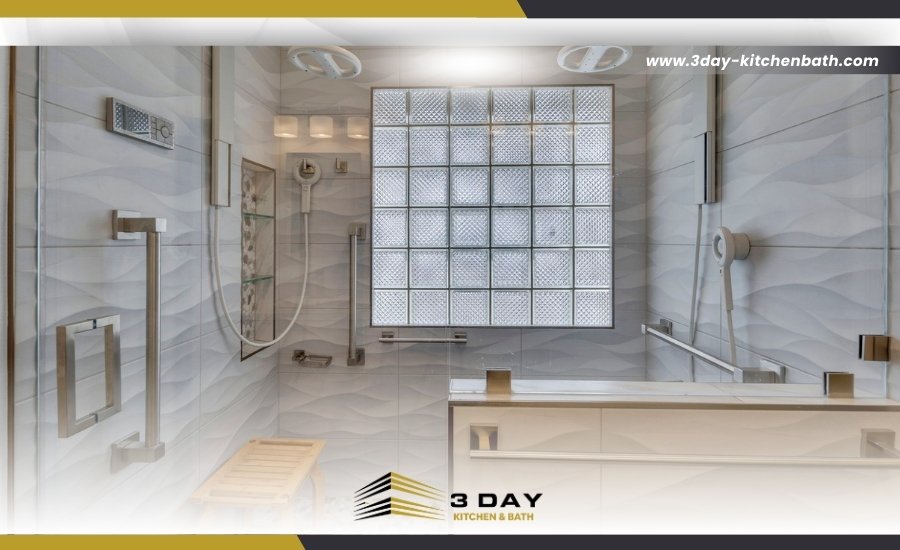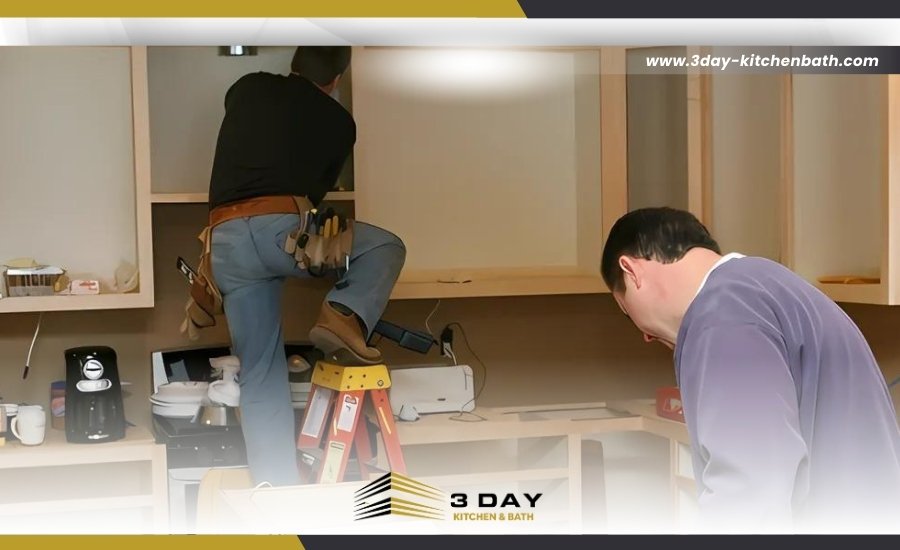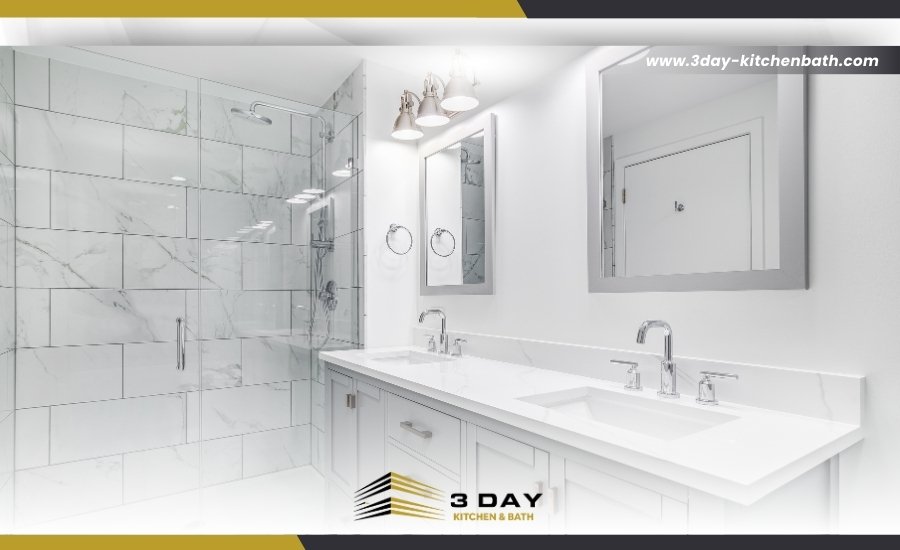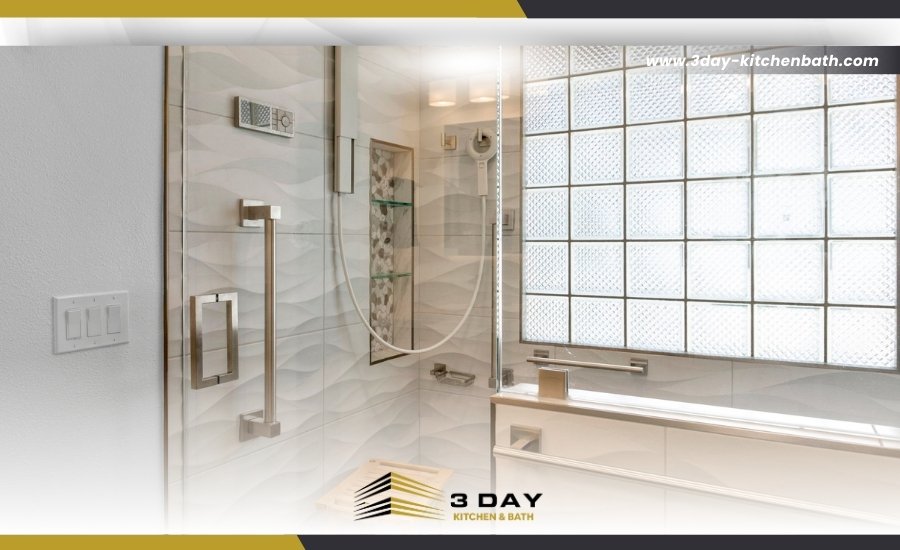Remodeling a bathroom is a significant home improvement project that requires careful planning. Whether it’s a small update or a complete renovation, understanding the duration of each phase will help you set realistic expectations and ensure your project stays on track. This guide will provide an overview of the factors affecting bathroom remodel timelines and offer tips for planning efficiently.
- Key Factors That Affect Bathroom Remodel Timelines
- Size and Scope of the Remodel
- DIY vs Hiring a Professional
- Step-by-Step Bathroom Remodel Timeline
- Demolition, Plumbing, and Electrical Rough-In
- Common Delays and How to Avoid Them
- Material Availability and Inspection Approvals
- Importance of Scheduling Inspections Early
- How Long Does It Take to Remodel a Shower or Floor
- Timelines for Tiling vs Vinyl Flooring
- Shower Remodel Durations and Material Considerations
- Small Bathroom vs Large Bathroom Remodel Timelines
- Estimated Time for Small and Large Bathroom Remodels
- What to Expect Based on Bathroom Size and Complexity
- Final Thoughts on Bathroom Remodel Duration and Planning
- Frequently Asked Questions
- What Are Some Budget-Friendly Ways to Remodel a Bathroom?
- Do I Need Permits for a Bathroom Remodel?
- How Can I Speed Up a Bathroom Remodel?
- What Should I Do to Prepare for a Bathroom Remodel?
- Can I Stay in My Home During a Bathroom Remodel?
- Get Started on Your Bathroom Remodel Today
Key Factors That Affect Bathroom Remodel Timelines
Several factors determine how long it takes to remodel a bathroom. Knowing these factors will allow you to estimate the time more accurately and avoid potential delays.
Size and Scope of the Remodel
The size of your bathroom and the scope of work are the primary factors influencing how long the remodel will take. A simple remodel, like upgrading fixtures or repainting, takes less time than a complete overhaul that involves structural changes, moving plumbing, or replacing all fixtures.
For example:
- Cosmetic updates: (e.g., changing the vanity, replacing fixtures, or updating the tiles) usually take around 5-10 days, depending on the availability of materials and the complexity of the installation.
- Full remodels: (e.g., changing the bathroom layout, adding new plumbing, or expanding the space) can take 4-8 weeks. This timeline may stretch if you encounter unforeseen issues like structural damage or hidden plumbing problems.
The scope also matters If your remodel involves only surface-level changes, it’ll be quicker. However, if it involves major plumbing or electrical work, it will take longer. For instance, moving a shower or bathtub could extend the timeline by several days.

DIY vs Hiring a Professional
Deciding whether to do the remodel yourself or hire a contractor is another key factor in determining the timeline.
- DIY Remodels: A do-it-yourself approach can save money, but it often takes much longer due to inexperience or limited time. If you're fitting the remodel around your daily life and commitments, it could take several months. You may also encounter delays if you’re unfamiliar with certain tasks, like installing electrical or plumbing systems.
- Hiring a Professional: Working with a contractor generally speeds up the process. Depending on the scope, a contractor with a dedicated team can complete the project in about 4-8 weeks. However, if your contractor is balancing multiple projects or waiting on materials, it may take longer.
Hiring professionals also reduces the chance of mistakes that could cause costly and time-consuming delays, such as incorrect tile installation or plumbing errors. If you want the remodel done efficiently and on schedule, hiring professionals is often the better option.
Step-by-Step Bathroom Remodel Timeline
Every bathroom remodel follows a series of phases. From the initial demolition to the final fixture installations, each step takes time and needs proper planning to stay on track. This section will walk you through the key phases in a bathroom remodel timeline, focusing on the most time-consuming stages and what to expect.
Demolition, Plumbing, and Electrical Rough-In
Demolition, plumbing, and electrical work are some of the most critical steps in a bathroom remodel. They mark the beginning of the physical construction and can heavily impact the overall timeline.
- Demolition: Depending on the size of your bathroom and the remodel scope, demolition can take 1 to 2 days. If you're removing fixtures, tiles, and drywall, or gutting the bathroom entirely, expect more time. Cosmetic demolition, like removing a vanity or toilet, will be quicker. Be prepared for unexpected surprises, like hidden water damage or mold, which could extend the demolition phase.
- Plumbing Rough-In: Once the demolition is done, the next step is plumbing. If your remodel involves moving fixtures like the toilet, shower, or sink, this phase can take 2-4 days. Rerouting pipes requires careful planning and inspections to ensure everything is up to code.
- Electrical Rough-In: Like plumbing, electrical work must be completed and inspected before moving on to the next steps. This phase generally takes 1-2 days but could take longer if you install new light fixtures, heated floors, or extra outlets.
Scheduling inspections during this phase is important to avoid unnecessary delays. Depending on your local regulations, inspections may take additional time.

Common Delays and How to Avoid Them
Bathroom remodels often face delays, which can stretch the timeline and add frustration. While some delays are unavoidable, many can be prevented with proper planning and communication with your contractor. This section focuses on the most common delays and offers tips to help you keep your remodel on track.
Material Availability and Inspection Approvals
One of the most common delays in a bathroom remodel is waiting for materials to arrive. Custom orders, imported tiles, or back-ordered items can add weeks to your timeline. Here are some steps to minimize delays caused by materials:
- Order materials early: As soon as your design is finalized, order everything you'll need for the remodel. This includes tiles, fixtures, cabinetry, and custom items that might take longer to arrive.
- Choose readily available options: If you’re on a tight timeline, opt for in-stock materials or easily sourced alternatives. This can prevent waiting weeks for specialty items to ship.
Inspections also pose potential delays. Plumbing and electrical work must pass inspection before moving on to the next phase. Scheduling inspectors can be tricky, especially if your local inspectors have busy schedules. Here’s how to avoid inspection-related delays:
- Schedule inspections in advance: Once you know when rough-in work will be completed, schedule inspections beforehand. Inspectors often have busy calendars, so booking in advance will keep your project on schedule.

Importance of Scheduling Inspections Early
To avoid long gaps between phases, schedule all necessary inspections early. Whether it’s for plumbing, electrical, or structural work, inspections ensure that everything complies with local building codes and safety standards. Delaying inspections can halt the progress of your remodel.
- Book ahead of time: Contractors often have a good sense of when an inspection will be needed, so it’s best to lock in appointments as soon as possible. This will prevent you from waiting days or weeks for an available slot.
- Have paperwork ready: Ensure all necessary documents and permits are organized before the inspector arrives. Any missing paperwork can cause the inspector to reschedule, leading to delays.
By being proactive about materials and inspections, you can significantly reduce the likelihood of delays and keep your bathroom remodel on track.
How Long Does It Take to Remodel a Shower or Floor
Remodeling a shower or bathroom floor can significantly impact the overall timeline of your project. The duration depends on the materials used and the complexity of the work involved. This section will explore the expected timeframes for these specific remodel tasks.
Timelines for Tiling vs Vinyl Flooring
Choosing the right flooring affects the look and timeline of your bathroom remodel. Tile and vinyl are popular options, but they require different amounts of time to install.
- Tiling: Installing tiles on the bathroom floor or shower walls can be a time-consuming process, especially if you’re using custom or intricate designs. For a typical bathroom, tile installation can take 3-7 days, depending on the size of the space and the complexity of the tile pattern. Preparation, including leveling and waterproofing, adds extra time to this step. Grout and adhesive also require drying time, further extending the timeline.
- Vinyl Flooring: Vinyl is quicker and easier to install than tile. Depending on the size of the bathroom, a professional can install vinyl flooring in just 1-2 days. Vinyl requires less preparation, making it a great choice for homeowners looking to complete their bathroom remodel faster.

The choice between tile and vinyl depends on your priorities—tile offers durability and style, while vinyl is more affordable and quicker to install.
Shower Remodel Durations and Material Considerations
Remodeling a shower involves multiple steps, from demolition to installing new tiles or shower walls. The materials you choose for the shower area can affect the project's duration.
- Shower Tile Installation: If you choose to tile the shower walls, the process can take around 5-7 days. This includes preparation (waterproofing the walls), setting the tiles, and allowing time for grout to dry. If you’re using custom or imported tiles, additional time might be needed for delivery and installation.
- Prefabricated Shower Inserts: Prefabricated shower inserts are faster to install. These come ready-made and can be implemented in just 1-2 days. There’s less waiting time involved, and since they don’t require the precision of tile work, they can be a great option for speeding up your remodel.
When remodeling your shower, it’s important to plan for drying and curing times. This helps prevent future issues like leaks or mold buildup.
Small Bathroom vs Large Bathroom Remodel Timelines
The size of your bathroom plays a crucial role in determining how long the remodel will take. Small bathrooms are generally faster to remodel, while larger bathrooms with more fixtures and features require additional time and planning.
Estimated Time for Small and Large Bathroom Remodels
The timeline for a bathroom remodel depends on both size and scope. Here's a breakdown of the expected time for different sizes:
- Small Bathroom Remodels: Small bathrooms, typically around 40 square feet or less, can be remodelled in 2-4 weeks, depending on the project's complexity. A cosmetic remodel with minor changes like new paint or fixtures can be done in under two weeks. However, if the remodel involves changes to the plumbing, electrical systems, or layout, expect the timeline to stretch to four weeks or more.
- Large Bathroom Remodels: Larger bathrooms, typically around 100 square feet or more, can take 4-8 weeks to remodel. Larger spaces usually involve more fixtures, such as double sinks, larger showers or tubs, and more extensive flooring, all of which add to the timeline. Additionally, if custom vanities or specialized materials are used, they can further extend the remodel duration.

What to Expect Based on Bathroom Size and Complexity
The complexity of your remodel, regardless of size, can significantly affect how long the project will take. A small bathroom with a complicated design or extensive plumbing and electrical work may take longer than a larger bathroom with simpler updates.
- Complex Remodels: If your remodel includes moving plumbing fixtures, adding new electrical systems, or using high-end materials, expect additional time. These elements require more planning, inspection, and specialized work, which can stretch the timeline by several weeks.
- Simpler Updates: On the other hand, a straightforward remodel focused on surface-level updates, such as new paint, fixtures, or flooring, will be completed more quickly. You can expect a simpler remodel to take less time, regardless of the size of the bathroom.
It’s important to balance your design goals with the available timeline. Planning in advance and working with experienced contractors can help ensure your bathroom remodel stays on schedule.
Final Thoughts on Bathroom Remodel Duration and Planning
Planning a bathroom remodel takes time, but understanding the process and the factors that affect the timeline will help you set realistic expectations. Whether you're handling a small update or a full renovation, knowing how long each phase will take ensures your project stays on track.
From demolition to the final fixtures, having a clear plan, working with experienced professionals, and ordering materials early can help you avoid delays. With the right approach, 3 Day Kitchen & Bath can help you transform your bathroom without unnecessary stress or an extended timeline.
Frequently Asked Questions
What Are Some Budget-Friendly Ways to Remodel a Bathroom?
There are several ways to remodel a bathroom without breaking the bank. Opt for affordable materials like vinyl flooring instead of tiles, or consider refinishing your bathtub instead of replacing it. DIY tasks like painting, updating light fixtures, and installing new faucets can also help reduce costs. Keeping the existing layout will save on plumbing and electrical expenses.
Do I Need Permits for a Bathroom Remodel?
Yes, you generally need permits for a bathroom remodel if the project involves changes to plumbing, electrical systems, or structural components. Simple cosmetic updates like painting or replacing fixtures usually do not require permits. Be sure to check with your local government or contractor to understand the specific permits needed in your area.
How Can I Speed Up a Bathroom Remodel?
To speed up a bathroom remodel, order all materials in advance and schedule necessary inspections early. Working with an experienced contractor can also help avoid delays. Opt for simpler designs and readily available materials to reduce waiting times. Proper planning and clear communication with your contractor will ensure the project moves smoothly.
What Should I Do to Prepare for a Bathroom Remodel?
Before starting your bathroom remodel, clear out all personal items and remove any accessories or furniture that could be in the way. Prepare for disruptions by setting up a temporary bathroom space elsewhere in your home. If you have children or pets, consider how you’ll keep them safe during the remodeling process, as construction areas can be hazardous.
Can I Stay in My Home During a Bathroom Remodel?
In most cases, you can stay in your home during a bathroom remodel, but it depends on the extent of the project. If your home has multiple bathrooms, the inconvenience will be minimal. However, if it’s your only bathroom or if the remodel involves extensive demolition or structural changes, you may need to consider temporary housing options.
Get Started on Your Bathroom Remodel Today
Contact our team for expert advice and guidance on your bathroom remodel. Let us help you create a space that fits your needs and schedule.









